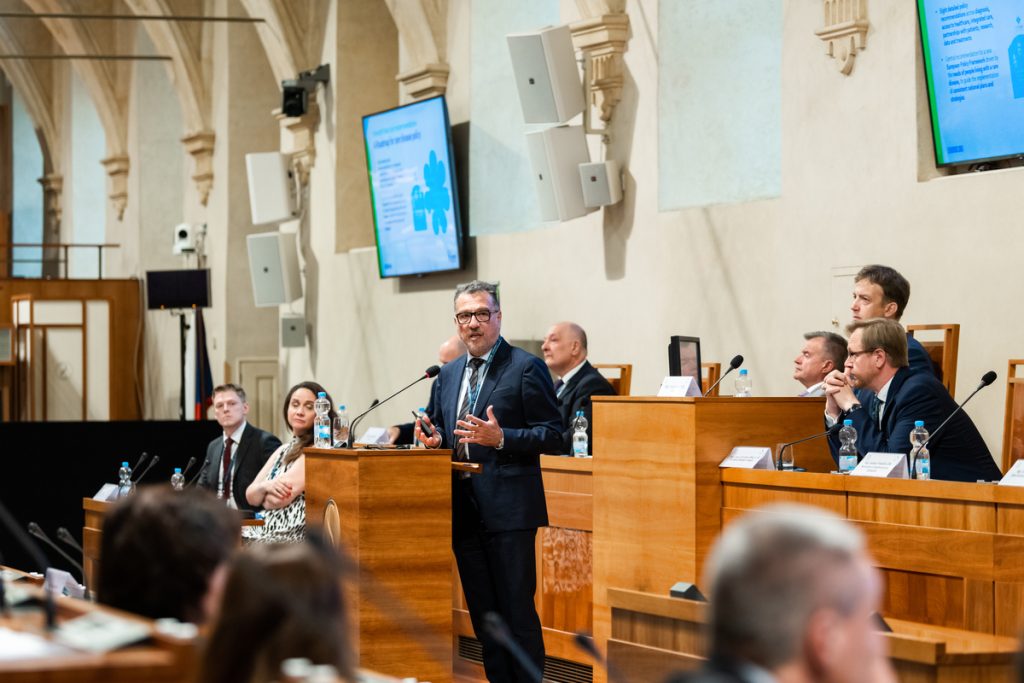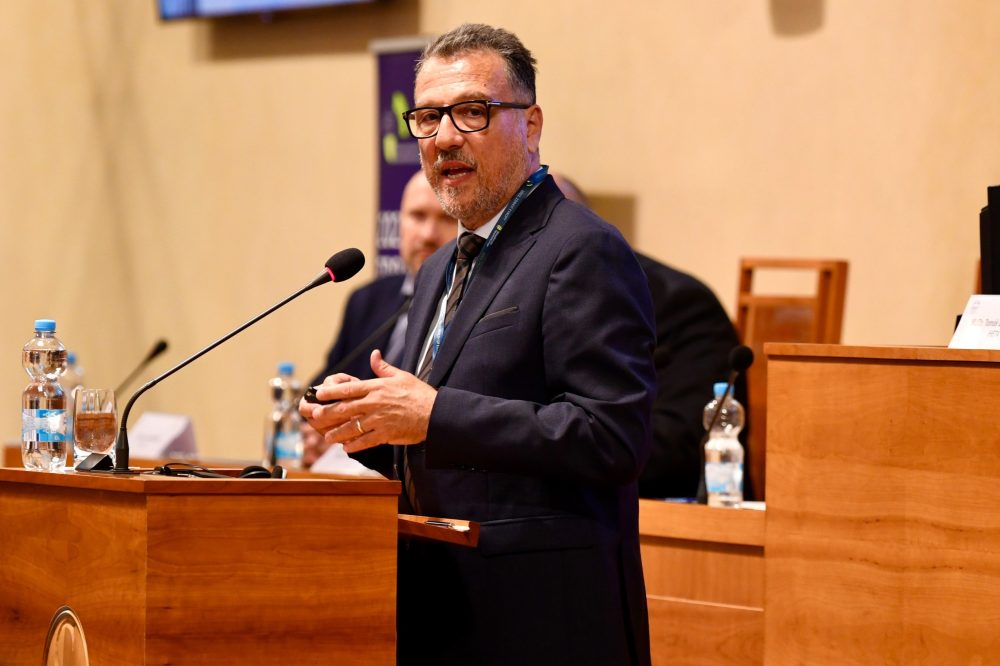The European Commission will soon present its revision of legislation on rare disease and pediatric medicines, which regulate the system of incentives and rewards for pharmaceutical companies to engage in research and development of these medicinal products. According to the CEO of influential non-profit organisation EURORDIS – Rare Disease Europe, joining more than 1000 patient organisations from 74 countries, Yann Le Cam, it is necessary to perceive this topic more broadly. That means not only from the point of view of investment incentives, but also readiness of health systems, payers, and real-world evidence availability. Yann Le Cam gave an interview to Zdravotnický deník when he visited Prague in May to have an opening speech at an international conference on rare diseases.
You have come to Prague on the eve of the Czech Presidency in the EU Council with a very concrete idea of what should be achieved in the EU as regards equal access to diagnosis and care for people with rare diseases. What do you expect from the Czech Presidency in this regard?
First, let me say that within the context of the Presidency trio (France, Czech Republic, and Sweden) we have already been working together for the last two years. My first meeting here at the ministry of health was already before covid. And my message at the conference is to say that the Czech Presidency needs to take the baton of what was initiated by the French Presidency and continue with the support for the European action plan on rare diseases. We can discuss key elements where we could progress. Early diagnostics and new-born screening is one thing, the second is that there is still same space for final talk on the revision of the orphan and pediatrics legislation which will come together with the big revision of the pharma legislation. And the third thing is access where the Czech Republic can play a key role.
What makes you think so?
The Czech Republic is a credible state in the terms of access to medicines. You have been providing orphan drugs and rare disease therapies pretty early to patients. And believe me that it is a very different situation in comparison with some other Member States, particularly in Central Europe. Here we would like the Czech Republic lead by example. The recent legislation your adopted goes really in the right direction.
In your presentation, you also mentioned the issue of joint procurement of medicines.
We rather call it “European table of negotiation” to negotiate and procure therapies. Whatever form it takes, it does not matter. France has open the door for more collaboration between Member States on real world evidence (RWE) post-marketing and on discussing data at the European level. And the Czech Presidency could move things further towards strengthening European collaboration in pricing and using its bargaining power. Even in rare diseases, the volume counts. And volume can be linked to price.
The centre of the discussions here is the growing pipeline of new gene and cell therapies, which are, from the point of view of a regulator, linked with quite a lot of uncertainties. How to tackle that?
Transformative therapies, as we call it. And also new biological therapies. Yes, there is still a high level of uncertainties, even if you have a positive risk-benefit assessment and conditional marketing authorization. Everybody is struggling with that because for the health technology assessment (HTA) you don’t have the evidence you need as regards its relative effectiveness. The second thing is how do you go from that to speak about the value and what you are ready to pay for, i.e. what is your value for money. It is almost an impossible discussion to have at the time of marketing authorization.
So what we say is that we need to go step by step. First, we need to provide access at the time of authorization. We agree on what the uncertainties are and what the key research questions are to reduce these uncertainties. We agree to collect RWE at the European level so that we proceed fast and with robust data. And then we re-asess, and, based on that, agree on the value. And then we can apply things like joint negotiations.
We also suggest to set up a fund to support RWE generation from marketing authorization for up to three years which could also pay for share of the costs of the treatment.
I also suppose that these therapies cannot be applied in just any common healthcare facility in any Member State.
Yes, most of the time they will be provided in only a few centers across Europe which are part of the European Reference Network. So again, what is the point of asking the companies to apply in twenty seven Member States and dozens of their different systems, in different languages, for a small number of patients? At the end, you pay the system of consultants and staff for nothing, there is no added value in that. We can have a centralized approach to it, with communication like: I have a patient from the Czech Republic, which I need to send to Italy. If we agree on the value of the medicine and price, I pay for it and send the patient. End of story. Why should I pay medicine agency and all the staff to do all the reviews which are useless?
Europe lags behind the USA
Does anything of what you have just suggested need to be reflected in the upcoming review of legislation on orphans?
I will answer in two parts. The first problem we try to address is the huge widely spread misunderstanding that the regulation deals with the access which is one of the main issues as regards rare diseases. But the regulation is there to support the investment. Therefore, we need to bring the two topics together, i.e. we need to progress on both, the legislative and non-legislative pack.
The second problem to be addressed is that we need to make Europe attractive for companies. Yes, in comparison with what was before, the orphans regulation is a success story and there is a large number of new medicines. But still, the number of medicines we have approved is behind the number approved in the USA several times. And the system in the US is evolving according to the trends which leaves us even more behind. Moreover, now we also have the UK, which is adapting very quickly, out of the EU, so we are losing their innovative, flexible and pragmatic spirit, and that is pity.
Mohlo by vás zaujímať
We want Europe to be considered as the first or second place for the companies where to do the development and market introduction. That is what counts. Today, we are second market after US, but soon we may become the third, fourth or even fifth market.
But there is an entire ecosystem beyond the regulation as such. It is not only about what happens in the EMA, but also about having healthcare systems ready for clinical trials, proper link with clinical research and networks, data collection, competencies of clinicians and paramedics, people collecting data on quality. That is why we promote a bigger agenda on rare diseases.
So what of what you just said can the regulation itself address and how?
We would like to see the incentives framework to evolve further and include a very early dialogue with the EMA. Today, the Agency provides scientific advice and protocol assistance, which is great and has proved a success. Twenty years ago, there was scepticism about it. Industry thought: we don’t want EMA to dictate to us what to do, the Member States thought: it creates too much sympathy and empathy from the regulators. Well, this is all discussion of the past. Everybody has recognized that scientific advice and protocol assistance makes better clinical trials, more ethical, faster, and there is better marketing outcome.
The very early dialogue is necessary and has a link to access because its approach is by disease. It could potentially be by technology, but it is first by disease. So you talk about what we know and what we don´t know about the disease as such. This way you may derisk the investment in this disease and have preparedness for the clinical trials.
How are these suggestions perceived by the Commission?
They are positive about the very early dialogue, rolling scientific advice as well as modulation of incentives for unmet medical needs – though here we might disagree what it is exactly. But I think we progress.
I will get back to the issue of unmet medical needs later. You have also suggested to strengthen the mandate of EMA´s Committee on Orphan Medicinal Product (COMP), which was set up by the orphan regulation to recommend orphan designation of medicines for rare diseases. In what way and why?
The committee is one of the rare advantages we have in comparison with the USA. Still it can become more competent, provide more support as regards both the development and risk-benefit assessment. Investigation plans for a particular rare disease could be developed similar to current pediatric investigation plans. COMP could do something like CAT (Committee for Advanced Therapies) does for EMA and its Committee for Human Medicinal Products (CHMP). You cannot expect that all members of the CHMP know everything about all rare diseases.
However, rare diseases are also closely linked with the issue of rare expert capacities. Are they sufficient for what you suggest?
We do have capacities because in Europe we have this decentralised regulatory system which use competencies of national medicine agencies and local medical experts. But we need to organize differently. COMP could work exactly like the CHMP works today, with some countries more specialised in particular areas, some in oncology, some in heart diseases, for instance. We could perfectly do the same with rare diseases i.e. sharing the competencies and work across different countries. That makes much more sense.

There are a lot of things ongoing but all that is isolated
Your final aim at the moment is the adoption of a European plan on rare diseases similar to the European Beating Cancer Plan. This, however, is a very complex document, starting with the prevention and ending up with the quality of life after the disease. Do you have similar ambition?
Our ambition is more limited. For now we leave out prevention and survival and quality of life. We focus on healthcare, research and data aspects. We already have something on track: European reference network or Partnership on rare diseases, we also want one on new-born screening. We also want the access to progress, maybe joint action on early dialogue with payers, and also on the negotiation. These flagships, already identified, could together provide a comprehensive approach. Then we would need a few years to see if it works, but after five years we could think about expanding to other elements, such as the quality of life.
Does your effort have support from EU institutions and Member States?
We believe yes. We have a strong support from the European Parliament as well as EU Council Presidencies. The real concern is the European Commission which is overloaded with work on different legislative and non-legislative packages. And probably, because of covid, Ukraine, or for other reasons, this Commission will not be able to achieve its goals. It will spill over to the next Commission. Wouldn´t it be nice then to have something in the pocket that they have done?
So far, however, rare diseases do not figure in the Commission´s work programmes.
Well, the spirit of that plan is not that the Commission is not doing anything today. There are a lot of things ongoing but all that is isolated. We need the goals to federate. The inspiration from the European Beating Cancer Plan is that it is an integrated plan, with tasks for the Commission as well as the Member States, across different policy areas. We are not asking for something as big as that, and neither for additional money as cancer has asked.
It is not that we don´t want more money, but it is not the top priority. The top priority is how to federate the actions and integrate, rather than to impose strict common actions and harmonisation. We would prefer focusing on the goals and measure these goals more in terms of survival, quality of life etc. Rather than focusing on the tools where the Member States should have more flexibility.
At the moment, in the EU a rare disease has been defined as a disease that affects five or less people in 10.000. Is this definition still valid?
It should remain the same in terms of prevalence. However, we suggest that we could add incidence of less than six in 10.000 to avoid artificial breakdown of non-rare diseases.
It would be a mistake to define unmet medical needs
There is a lot of discussion about possible legislative definition of unmet medical needs, which is one of the core issues when we talk about rare diseases. As science and technologies develop rather quickly, is it reasonable to have such a fixed definition?
Well, we are asking to address unmet medical needs. We disagree with the European Commission that an unmet medical need should be defined in the legislation. We thing that it is a mistake. How do you define it? That is really complicated.
Why?
With a definition you, at the same time, create categories that exclude. What is a need met? Is it that you have a treatment for a particular disease approved as I hear in some discussions? In that case, an unmet medical need would mean that it is a situation when there is no treatment approved. But you may have a therapy and still you are dying at fifteen years….Or in cancer, what do we consider a need met? We accept that a three-, six-months survival is a progress…. Therefore, we rather suggest to incentivise broadly and create a supplemental advantage in areas where there is no research or where there are no, or only one or two products, approved. This brings be back to the very early dialogue I mentioned. It is there where unmet medical needs should be discussed and identified.
I will give you an example. In the past, we had hospital preparations which later were transformed into designated and approved medicines. And they entered the market with very high prices compared to what they cost before. So, on the one hand, the company had done what you would have expected it to do, i.e. develop stable and quality manufacturing, providing more data on safety and efficacy. Except that in all these cases the products were already safe – there were no issues on safety – they were cheap and there was the knowledge and access in many Member States. Now, after approval, some countries do not have access to such medicine anymore and, according to the law, they are not supposed to continue in the hospital preparations. So it is problematic for everyone. Companies do not find their market, patients have less access, clinicians are despaired. Had there been an early dialogue, we could have asked: do we have an unmet medical need here? Maybe the company would have been told: We are not interested.
So as regards unmet medical needs, it should be a discussion and not a definition.
To drive the investments, it is more about incentivising and leaving the flexibility to the interpretation of where there is an unmet medical need. Leave it to the actors, trust the people. What are the needs going to be like in the next twenty years? Nobody knows, so let´s not try to figure that out now.
Is there trust between the Commission, Member States, and the industry?
Trust is obviously a big issue and particularly between the economic actors like the industry or public decision makers, particularly HTA and payers. It has improved certainly with covid because it has been the industry that provided the solution rapidly. And everybody learnt that we are able to proceed fast together, that it is possible. It does change a lot for rare diseases. We have been talking long about fast-tracking of some approvals, procurement, etc……well, nice discussions but no progress. Now the reaction is like: ok, good.
So the positive thing about covid is that it has provided a better background for a discussion on the revision and all the issues you mentioned?
We believe so. But the trust is still a big issue. What is poisoning it is what is considered as high prices in some situations. And not everybody acts in a responsible way here. Not only by the act but also by the speech attached to it as the companies communicate to both the financial markets and payers.
Helena Sedláčková
The conference on the „Revision of EU legislation for orphan medicines and medicines for paediatric use“ was organised by the Senate of the Parliament of the Czech Republic in expert collaboration with the Association of Innovative Pharmaceutical Industry.

